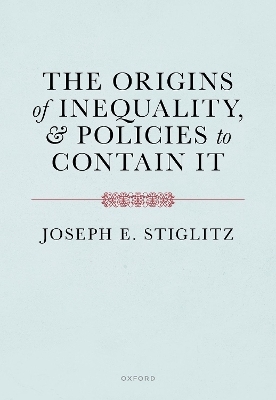
The Origins of Inequality
Oxford University Press (Verlag)
978-0-19-879959-7 (ISBN)
- Noch nicht erschienen (ca. Februar 2025)
- Versandkostenfrei
- Auch auf Rechnung
- Artikel merken
Joseph Stiglitz has had a remarkable career. He is a brilliant academic, capped by sharing the Nobel Memorial Prize in Economics and the Nobel Peace Prize, and honorary degrees from Harvard, Cambridge, Oxford and more than fifty other universities, and elected not only to the National Academy of Sciences and the American Academy of Arts and Letters but the Royal Society and the British Academy; a public servant, who served as Chair of President Clinton's Council of Economic Advisors and Chief Economist and Senior Vice President of the World Bank, headed international commissions for the UN and France, and was awarded the French Legion of Honor and Australia's Sydney Peace Prize; a public intellectual whose numerous books on vital topics have been best sellers.
What brought him to economics were his concerns about the inequality and discrimination he saw growing up. Wanting to understand what drives it and what can be done about it has been his lifelong passion. This book gathers together and extends to new frontiers this lifelong work, drawing upon the challenges and insights of each of these phases of his career.
In a still very widely cited paper written fifty years ago, Stiglitz set forth the fundamental framework for analyzing intergenerational transfer of wealth and advantage, which plays a central role in persistent inequality. That and subsequent work, developed most fully here for the first time, described today's inequality as a result of centrifugal forces increasing inequality and centripetal forces reducing it. In recent decades, the centrifugal forces have strengthened, the centripetal forces weakened. His general theory provides a framework for understanding the marked growth in inequality in recent decades, and for devising policies to reduce it.
A central message is that ever-increasing inequality is not inevitable. Inequality is, in a fundamental sense, a choice. Stiglitz explains that inequality does not largely arise from differences in savings rates between capitalists and others, though that may play a role (as Piketty, Marx, and Kaldor suggest); but rather, it originates importantly from the rules of the game, which have weakened the bargaining power of workers as they have increased the market power of corporations. He also explains how monetary authorities have contributed to increasing wealth inequality, and how, unless something is done about it, likely changes in technology such as AI and robotization will make matters worse. He describes policies that can simultaneously reduce inequality and improve economic performance.
Joseph E. Stiglitz is an American economist and a professor at Columbia University. He is also the co-chair of the High-Level Expert Group on the Measurement of Economic Performance and Social Progress at the OECD, and the Chief Economist of the Roosevelt Institute. A recipient of the Nobel Memorial Prize in Economic Sciences (2001) and the John Bates Clark Medal (1979), he is a former senior vice president and chief economist of the World Bank and a former member and chairman of the (US president's) Council of Economic Advisers. In 2000, Stiglitz founded the Initiative for Policy Dialogue, a think tank on international development based at Columbia University. He has been a member of the Columbia faculty since 2001 and received that university's highest academic rank (university professor) in 2003.
Part I. Broader Perspectives
1: A Rigged Economy and What We Can Do About It
2: The Origins of Inequality, and Policies to Contain It
3: Inequality and Economic Growth
4: Alternative Theories of Inequality: Historical and Theoretical Perspectives
5: Rewriting the Rules of the Economy and the Shaping of American Inequality
6: Wealth and Income Distribution: New Theories Needed for a New Era
7: Eliminating Extreme Inequality: A Sustainable Development Goal
Part II. The Basic Theory
8: Distribution of Income and Wealth Among Individuals
9: Intergenerational Transfers and Inequality
10: Explaining the New Stylized Facts of Growth and Distribution
11: Generalizing the Basic Model: Inequalities in Equilibrium Wealth Among Individuals with Heterogeneous Abilities and General Intertemporal Preferences
12: Equilibrium Income and Wealth Distributions: Balancing Centrifugal and Centripetal forces
13: The Role of Life Cycle Savings vs. Inherited Savings
14: The Role of Land and Credit in Creating Wealth Inequality
15: The Role of Credit and the Financial System in Creating Wealth Inequality
16: Monopoly, Rents, and Political Equilibrium
17: Distribution and Innovation (or inequality and innovation)
18: The Future of Inequality: Artificial Intelligence, Worker-Replacing Technological Progress and Income Distribution
19: Pareto Efficient Taxation and Expenditures: Pre- and Re-distribution
Part III. Earlier Contributions
20: Some Further Results on the Measurement of Inequality
21: Simple Formulae for the Measurement of Inequality and the Optimal Linear Income Tax
22: Dynastic Inequality, Mobility and Equality of Opportunity
23: Reflections on Mobility and Social Justice, Economic Efficiency, and Individual Responsibility
24: Remarks on Inequality, Agency Costs, and Economic Efficiency
25: Credit Rationing, Tenancy, Productivity and the Dynamics of Inequality
26: Landlords, Tenants and Technological Innovations
27: Inequality and Growth
28: A Two-Sector, Two Class Model of Economic Growth
29: Capital, Wages and Structural Unemployment
30: Inequality and the Business Cycle
31: Macroeconomic Fluctuations, Inequality, and Growth
32: Notes on Estate Taxes, Redistribution and the Concept of Balanced Growth Path Incidence
33: Equality, Taxation, and Inheritance
34: Approaches to the Economics of Discrimination
35: Theories of Discrimination and Economic Policy
36: Inequality and Taxation
37: The Welfare State in the Twenty First Century
| Erscheint lt. Verlag | 6.2.2025 |
|---|---|
| Verlagsort | Oxford |
| Sprache | englisch |
| Maße | 171 x 246 mm |
| Themenwelt | Wirtschaft ► Allgemeines / Lexika |
| Wirtschaft ► Volkswirtschaftslehre ► Wirtschaftspolitik | |
| ISBN-10 | 0-19-879959-4 / 0198799594 |
| ISBN-13 | 978-0-19-879959-7 / 9780198799597 |
| Zustand | Neuware |
| Informationen gemäß Produktsicherheitsverordnung (GPSR) | |
| Haben Sie eine Frage zum Produkt? |
aus dem Bereich


